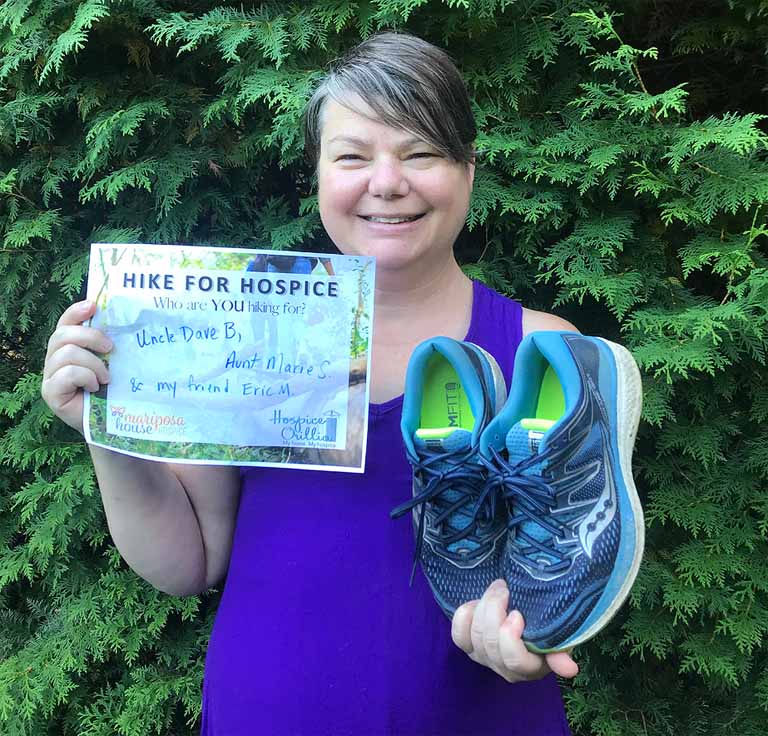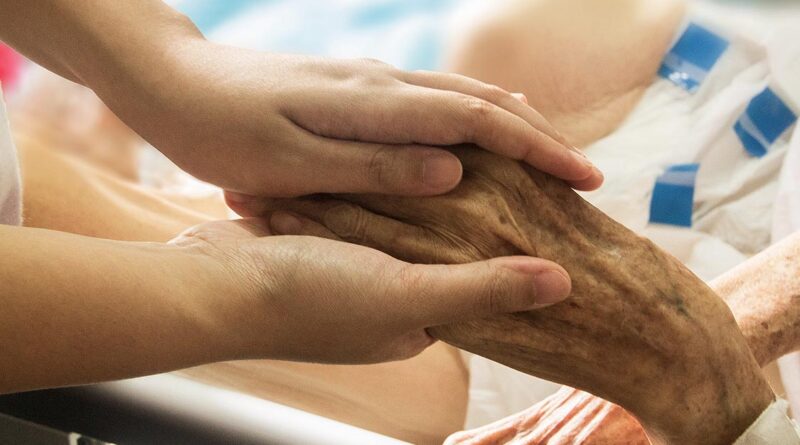Q & A With Hospice Leadership
By Amanda Tevelde – Special to SUNonline/Orillia
As this three-part series on Hospice Orillia and Mariposa House Hospice wraps up, we will learn what it is like to be at the helm of a hospice organization. Hospice Orillia and Mariposa House Hospice are in a unique position since they both serve the same catchment area, while providing different programs at a variety of stages in a client’s journey. It is not uncommon for a client to go from receiving support from Hospice Orillia’s visiting volunteer program, and then move to Mariposa House Hospice to use their residential hospice services during their final days; then their loved ones may return to Hospice Orillia for grief support. While they are separate organizations, they often work together to complete the continuum of care for a client and their family members. Meet Annalise Stenekes, executive director of Mariposa House Hospice and Whitney Vowels, executive director of Hospice Orillia and find out how the organizations fit in the community.
Why did you choose to work in Hospice Palliative Care?

Annalise – I originally started as a volunteer and it was through that experience I was immediately drawn to working in the field. Having the ability to connect with people who were going through this phase of their life was something that really showed me what I was meant to do. As the years went on, employment opportunities presented themselves, which I accepted and as I did, the various positions helped me grow and deepen my passion for hospice palliative care.
Whitney – Many years ago, after losing a loved one, I realized how important it is to have exceptional care and support after a life-limiting diagnosis, not only for patients, but for their loved ones as well. I knew hospice palliative care had become important to me and I wanted to be part of an organization that not only provided care and support related to death, dying and bereavement, but one that was able to make a difference to those going through those experiences while being able to focus on what’s important to them.
How do you feel about the difference your organization makes for its clients?
Annalise – For Mariposa House Hospice I think the difference is multifaceted; there is a positive impact for residents as well as the family, friends and caregivers. When a resident arrives, the difference is seen almost immediately as they settle into the homelike setting where they have access to care 24/7 and can continue to welcome visitors. For the caregiver it’s about not having to worry about running a home and administering care to their loved one. It makes me proud to know we are providing the residents and their loved ones with an environment where they are able to soak up whatever time they have left with each other.

Whitney – I am grateful that we are able to be part of their journey and help make a difference in their lives and the lives of their families. At Hospice Orillia we want people to be able to have the best quality of life, right to their final days, and knowing we’ve made a positive impact in their care is so meaningful. It’s a true gift to know that we’re also able to help people cope with loss through our grief and bereavement programs. When you know you’re helping to improve someone’s difficult journey at a point when it’s most precious, it’s life changing.
What is something you want people to know about Mariposa House Hospice?
Annalise – That volunteers make it possible for us to do what we do. We rely on volunteer engagement inside the house, on the grounds and with fundraising or administrative tasks. Without them we would really be stuck. Our volunteers do more than just donate their time; by providing support to Mariposa House Hospice, they are ensuring that we are able to keep our operating costs as low as possible. Having individuals volunteer their time at the reception desk, in the kitchen or in the gardens, or organizing our events allows us to keep our staffing model lean and to focus our fundraising efforts. Having volunteers help us in so many different ways also plays a big role in creating a friendly, welcoming culture.
What is something you want people to know about Hospice Orillia?
Whitney – That we offer practical, emotional and spiritual support to those in our community coping with advanced illness, death and bereavement. Not only do we provide on-going support from the time of someone’s diagnosis, but we also provide bereavement support after a death. We know that sometimes living with an illness means that your life gets turned upside down: financially, socially, and spiritually. We, along with our dedicated volunteers, want to help you through these challenging changes so that you can have the best life possible.
What is a common misconception that you would like to clear up?
Annalise – The main misconception is that we are fully funded. Like other Hospice organizations, we are only partially funded and rely on community support. The services we provide include health care, but they extend beyond health to include social care as well. We provide a holistic style of care where we try to address a variety of domains, making hospice organizations multifaceted. We need the community to believe in what we do and to continue to provide financial support.
Whitney – Like Mariposa House Hospice, Hospice Orillia is only partially funded. In addition to the financial support we receive from the community, we rely on the generosity of our volunteers. By donating their time, volunteers are providing a cost-effective way for us to provide programs within the community. The hours provided by our volunteers assist us with more than just their time; they are lending their shoulders and hearts to our clients who are in need of support. People often think that hospice palliative care is only an option when there’s nothing more that can be done. Nothing could be further from the truth. Hospice palliative care is about living well, making sure that your pain and your symptoms are managed, while encouraging you to focus on the things that really matter, whatever that may be for you. At Hospice Orillia it’s about making sure that caregivers are supported, so that they can live well too; it’s about helping people with their grief, so that they can experience life after loss.
When is the proper time for people to connect with your organization for support?
Annalise – While people use residential hospice care at the end-of-life, which is typically the final weeks or days of one’s life, we suggest that an individual speak with their home and community care coordinator as soon as possible to be considered for residential hospice care when the time comes. By filling out the paperwork you will be on a referral list and will be monitored to see if you want or need to come in. It is best to have this plan in place prior to being at the point of crisis. The challenge for all residential hospices is that there is no guarantee that a bed will be available when needed. If you are on the referral list there is a better chance that we can get the timing right. It’s important for people to know that this would be a back-up plan and it does not mean you absolutely must go into a residential hospice. You can always change your mind.
Whitney – For Hospice Orillia, it is all dependant on what type of support people need. If someone has been diagnosed with a life-limiting illness, we offer a plethora of programs and services to not only assist them, but their loved ones as well. We also assist those needing bereavement support that may not be related to losing someone due to a life-limiting illness. Each one of our programs has a different focus, and has been designed to help individuals, friends and family members in different ways. The best recommendation on timing is to reach out as soon as possible and our team will help to create a plan for support that best suits your needs.
Is there a cost for support?
Annalise – No, but we are only partially funded by the provincial government and we do gratefully accept memorial donations, donation of shares, monthly donations as well as contributions to the annual Hike for Hospice (a partnership with Hospice Orillia)
Whitney – While there is no cost for the community to access the programs provided through Hospice Orillia, there is a cost to keep the programs running which is why we rely so heavily on the generous donations from the community.
Hospice palliative care is something people only tend to think about once they are in need of end-of-life care. We hope that this series has provided our readers with some insight of how both Hospice Orillia and Mariposa House Hospice serve the community of Orillia and surrounding areas not only at end-of-life but well before and after through grief and bereavement support.
While they may provide different services to the community, one thing is for sure, both organizations are integral parts of our community. As a partially funded organizations relying on community support, there are plenty of ways you can help ensure hospice palliative care and bereavement support remain available and accessible in our community. For information on how you can help please visit the Hospice Orillia, or Mariposa House Hospice websites.
(Photos Submitted) Main: Hospice volunteers June Gunn, Janette Mainey and Anneke Sharpe.
Read part one here.
Part two here
Comment




